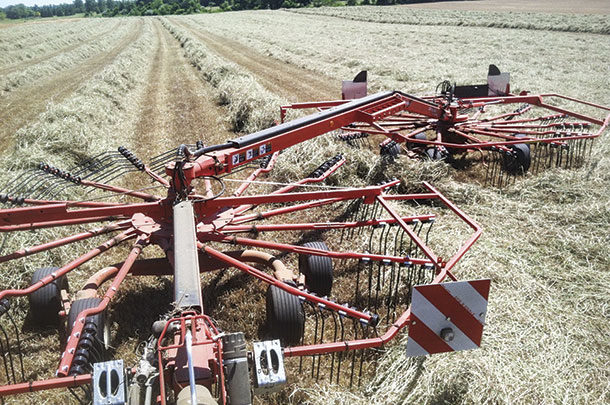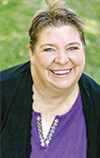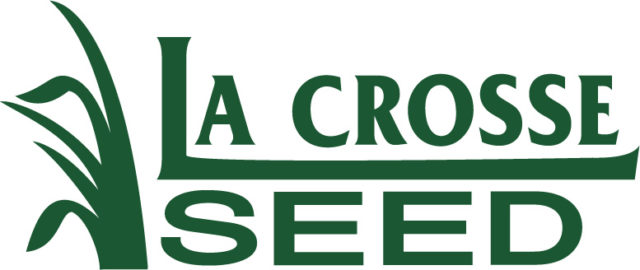At one time, each of the four sons got a piece of the farm, but over the next eleven generations, that same farm has continued to evolve and change, dwindling down to the current 400 acres where brothers David and George Holmes still live. The once-thriving dairy farm – one of the over 900 original dairies that inspired the town name (along with the ridge behind the dairy) – is no longer a dairy farm.
The cows were sold, and additional capital needed to be found doing something else. And so it was, that in 1975, David Holmes started his forage business. In 1982, he brought in his younger brother George as a full partner, and in 1993, they formed their partnership into an LLC.

“We make all of our bigger decisions jointly,” David Holmes says. “Other than that, I do the office work and bookkeeping, but I also do the machinery repair when needed, and I’m the backup truck driver when I am needed. George handles the deliveries and is the main truck driver.”
Over time, their forage business has evolved to keep them in business. What once was a forage business geared toward the dairy industry has gravitated more toward the Thoroughbred horse industry and is now shifting a little more.
“We are close to the Belmont Park raceway and the Yonkers raceway, and we deliver a lot of hay there,” David says. “But we are also fairly close to several horse tracks in eastern Pennsylvania, and we are only 1,200 miles to the race tracks in Florida, so we also ship hay down there.”
They raise much of their own forage including hay, straw and soybeans, but they have branched out to include the following varieties grown either on their own place or from neighboring farms – alfalfa hay, timothy, orchardgrass hay, fescue and a specialty product called precut long rye straw that has been specifically developed for the Thoroughbred market.
They also sell mixes of all of these forages. Occasionally, they will have a request for a sample to be evaluated, but with a $30 fee attached to a forage test, they will only do it when requested.
“Why pay for something you might not need or want to take the time to wait for?” David says.
The brothers run their business with four 18-wheelers along with eight trailers, a dozen tractors and a fleet of pickup trucks. They recently purchased Freeman balers that are more commonly used in the western U.S. The Holmes’ feel this has made their business more productive, and they have never regretted it.
All of their prices are based on what type of forage they are selling – the quality, the quantity – and the logistics of delivery. They will ship it, drive and deliver it themselves, or sell it straight from the farm. At times, they have hired other firms to move the crop if there is a bigger or more pressing need than they have the ability to handle.

David says they actually bale significantly less than they used to before the economic dip that occurred 10 years ago.
“We used to be larger, but there aren’t as many race horses around here as there used to be. We lost a lot of business when the bottom dropped out of the market, and we haven’t recovered that business,” Holmes says. “It is mostly because we live in a state that isn’t very supportive of the horse racing industry or other agricultural industries either.”
It’s a very competitive market and the biggest issue they have faced has been local government issues that are perceived as anti-small business.
“It’s a many-faceted issue, and we’re not the only ones who have been affected,” David says. “The costs of doing business are high, and we can’t just raise prices; we are in a very competitive environment.”
He says that because of the business environment, they aren’t expanding as they can’t see enough benefit to want to risk the money to expand, although he says they might expand in certain areas if the risk is good. Right now, they are focused on hanging on to what they have. With both partners in their 60s, they are just taking care of what they have, tweaking things as they go.
The Holmes’ say they aren’t sure what will happen to the farm and forage business when they both retire. Both brothers have two sons, but the younger generation hasn’t been interested in staying on the farm and has moved on to other professions across the country.
Perhaps the largest obstacle the Holmes brothers face as a business is the encroaching urbanization of the local area. The Holmes say that in their area where there used to be over 900 dairies, there aren’t any left. The closest dairy now is quite some distance away. The closest location to purchase equipment or find repair parts is over 100 miles away.
“New Jersey just doesn’t appreciate their agricultural roots like they used to,” David says. “It’s becoming more urban as time goes on.”
David says if he “had it to do all over again,” he would have purchased more land.
“We weren’t real aggressive, and we didn’t take as much risk as we could have,” he says.
While he isn’t sure what will happen with the family farm, life isn’t as dismal as it might possibly sound. He says the outlook for entertainment agriculture and farming is still pretty high, with breweries and pumpkin farms with wagon rides. All of these have their place in farmland preservation.
“The outlook for agriculture is good, but it is changing to more entertainment farming,” he says. “We just need to keep changing too.” ![]()
PHOTO 1: Raking the timothy on the Holmes farm is easier with a larger implement. This timothy is part of the crop sold off of the Holmes brothers’ farm each year and is what keeps the farm solvent. Photo courtesy of Holmes Brothers LLC.
PHOTO 2: George Holmes of Cream Ridge, New Jersey, picks up a load of timothy hay at Eldred Hay, Grain & Seed in Auburn, New York.
PHOTO 3: Workers at Eldred Hay, Grain & Seed load a truck for Holmes Brothers LLC for transport to New Jersey. Photos by Lynn Jaynes.
Becky Cook is a freelance writer based in Idaho.













